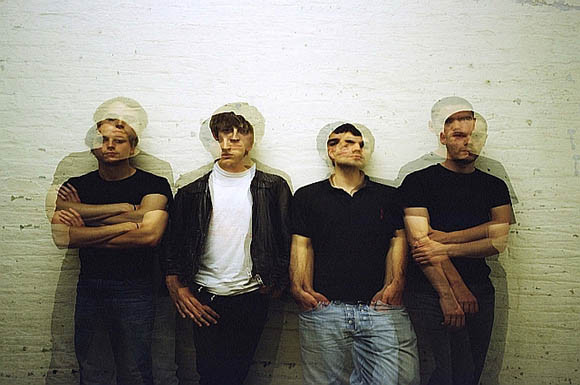Keith are Oli Bayston (Vocals, Keys), John Waddington (Bass), Johnny Winbolt-Lewis (Drums) and Mark Nicholls (Guitar). The four met as music production students at college in Warrington, a satellite campus of The University of Manchester. At the end of their studies in Warrington, the four decamped to Manchester and found themselves welcomed into a party scene centring on the south Manchester suburbs of Chorlton and Withington. Word spread quickly around their adopted-home city, and Manchester took them to it’s heart like one of their own.
They seemed to touch effortlessly on Mancunian reference points without being backwards-looking or reverential, though the one unifying element in their sound was the lack of easily identifiable styles; it’s there in the Morrissey-esque twang in Oli’s vocals, the echoes of Joy Division-era Hooky in John’s insistent bass, and the references to A Certain Ratio’s proto-house drumming in Johnny’s intricate beats. But there’s more there too: Krautrock, Afrobeat, Jazz and Electronica all bubble up in Keith’s mix.
It’s this eclecticism that led the band to call their 2006 debut Red Thread. Industry types talk of finding the ‘red thread’ that links each song in a band’s cannon. Not sure if they’d found one, Keith instead used the term as the name of their album.
On its release, Red Thread became a cult hit, never quite reaching its full potential but scoring big with tastemakers. In Japan, Keith were embraced as one of the UK’s new treasures, and found rapturous audiences wherever they played. Though the album didn’t quite make the leap to the mainstream, Keith’s consummate musicianship saw them dip a toe in those murky waters. They can be heard on Lily Allen’s Alright, Still, as the producers were looking for a “Manchester groove” and looked to Keith to supply it. They appeared un-credited, for fear of being named “Lily Allen’s backing band” for eternity.
Various members worked with some personal heroes too. Can’s Damo Suzuki invited Johnny to play an improvised set with him in Liverpool, thereby granting him membership of Damo Suzuki’s Network. Later, Johnny and John backed label-mate Sebastien Tellier at a number of UK live shows, performing his classic La Ritournelle. In each case, music was the only common language – neither Suzuki nor Tellier speak perfect English. “Every collaboration is lost in translation,” says Oli, poetically.
The band conceived sophomore Vice & Virtue (2009) soon after completing Red Thread, and worked on a taut group of ten songs that would propel them in their intended direction: darker, more psychedelic and more unified in their message. Having delivered a debut album of broad strokes and varied styles, Vice & Virtue found them focused on producing an ambitiously accomplished follow-up, with texture, tone and – importantly – tunes. Wunderkind producer Dan Carey, who worked simultaneously on the Franz Ferdinand album, brought whip-smart editing, electronic flourishes and a newly invigorated sound.
Most recently the foursome recorded in Salford’s Sacred Trinity Church, with the aim to produce a series of extra tracks with a warm, organic feel that’s at odds with the electronic album.
As Oli says “We were hoping to provide some form of sonic antidote to the intense groove-based nature of Vice & Virtue. Almost like a bed time record, something to lull you into a dream.”
The resulting recordings are collected upon the Threes EP, which sadly is to be the last release by the band, as the foursome have decided to close the chapter on Keith. It is a fitting footnote to the career of one of the most furiously creative, but criminally under-rated, bands in the UK. Their music was and always is for both sides of the brain – the intellectual and visceral, the artistic and the mathematic, the virtuous and the vicious – and every beat of the heart.
“other bands may currently be overshadowed by the attention justly lavished upon Elbow, but young four piece Keith may soon share their pedestal.” Q
“a melange of styles and sounds containing echoes of early (i.e good) Verve, Stereolab and Doves, while never really sounding like anything other than itself. Vice and Virtue proves Keith to be on the side of the angels” NME
“every song on their second album points to a potential brilliance” Guardian
“In one song (Keith) have got more easy-going charm and credible yet-commercial swagger than most indie bands achieve in a whole career. A modern update on the old Madchester blueprint but sounds vital and fresh. Uncatergorisably ace” iDJ
“Keith aim to defeat the blandness that permeates most bands. It works live and it works on record. The fact is: it works!” The Fly
